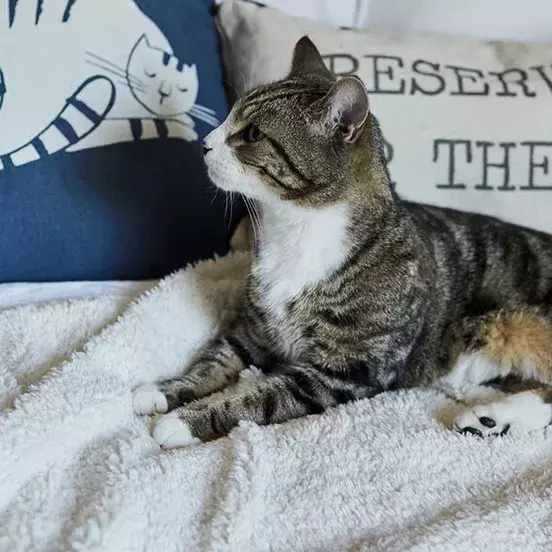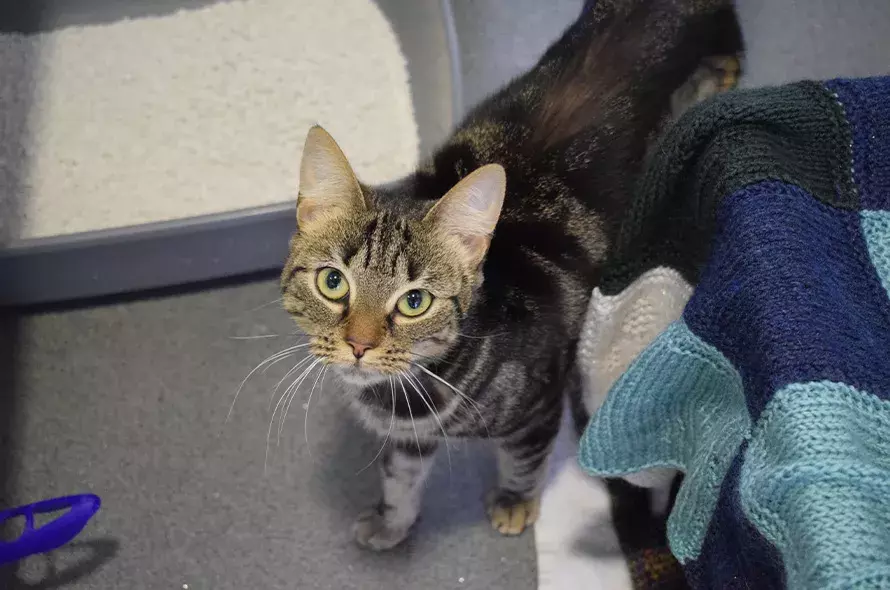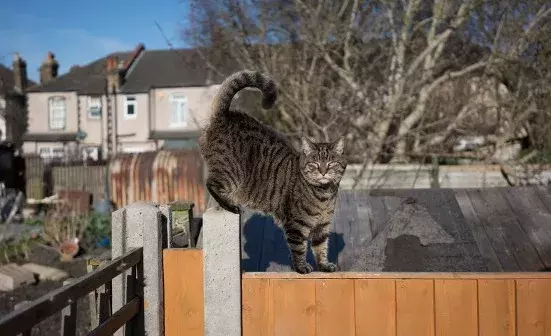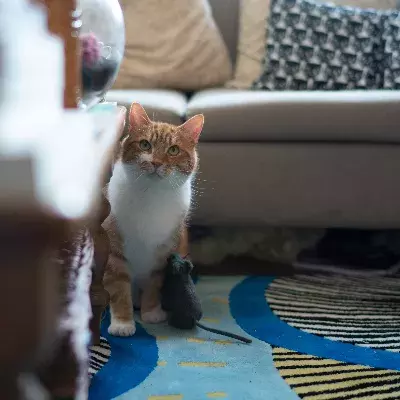Cat spraying (Urine spraying) is the term used to describe a normal territory-marking behaviour in cats whereby they spray in prominent places, mainly on vertical surfaces.
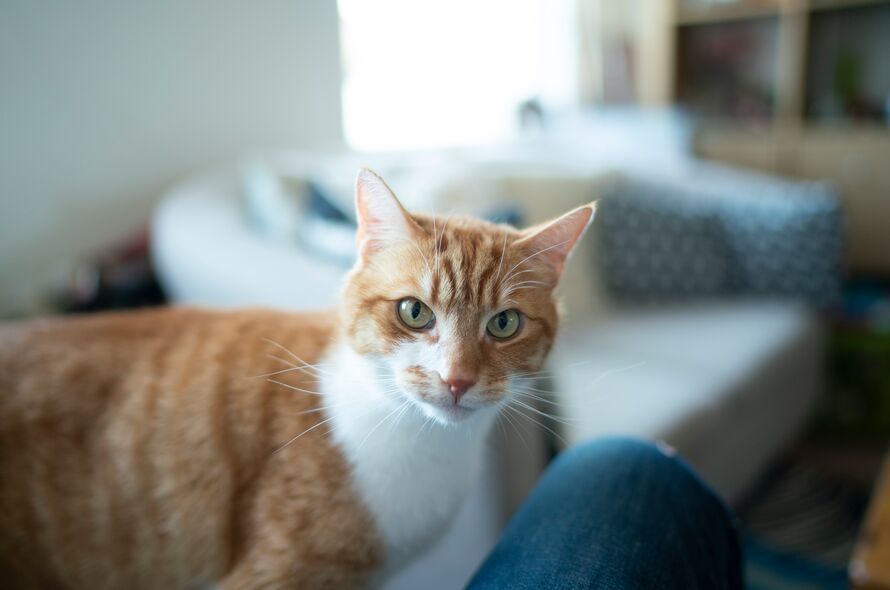
Your cat will use spraying as a way to mark territory and reduce the likelihood of conflict with other cats. Un-neutered cats also spray to attract a mate during breeding season.
Cats normally spray in specific places:
- Thoroughfares and places where people come and go from the house
- Full-length curtains which are usually positioned next to potential entry and exit points (e.g. doors, windows)
- New items, or ones which smell differently, e.g. suitcases, handbags, shoes and coats
- Items that heat up and cool down (e.g. radiators, electrical equipment) – presumably due to the change in their smell as the temperature changes
In cases of indoor urine spraying, cats will frequently mark the same area to ‘top up’ the fading smell of a previous mark so you may find several areas in the home that are marked repeatedly.
WHY IS MY CAT SPRAYING?
Cats who haven’t been neutered will use spraying as a way to attract a mate. Neutering your cat will reduce the amount of spraying of this kind, if not stop it completely. If your neutered cat is spraying this is called “reactional spraying”. This kind of spraying occurs when there has been a change in your cat’s environment, either physically, or with the addition of new cats or people. There’s most likely to be a reaction when the change is in a place where they usually feel safe (called their ‘core area’) which is where they eat, sleep and play. It doesn’t matter whether your cat is confident or anxious, male or female – any cat will spray if they feel like they need to.
Spraying of this kind normally becomes an issue when a cat feels threatened by something in the house and sprays indoors in order to help them feel safer.
WHAT SHOULD I DO IF MY CAT SPRAYS?
If your cat sprays, don’t panic. Clean the area, and don’t punish your cat. Your cat is spraying for a reason and it’s important to figure out why so that you can help them, and prevent it happening again.
Firstly, you need to rule out a medical reason for the spraying. Contact your vet and arrange for a thorough health check. If your vet is unable to find a physical reason why your cat is spraying, then it might be a behavioural issue. It could be something like the introduction of a new cat or dog, to the household or a less obvious trigger like a new cat in the area that might be coming in through the cat flap at night. While you are trying to resolve the problem, treat your cat as you would normally. Cats are very in tune with changes in their owner’s behaviour and if they feel unsettled this could lead to more spraying.
How do I clean the place my cat is spraying?
If your cat has sprayed on curtains or upholstery, then you can use an enzymatic cleaner specifically sold for removing urine stains and odour. Some items may need to be professionally cleaned. You might then want to move these items out of the way while you deal with the issue of your cat spraying. For example, you could remove curtains or secure them above the level of your cat, cover furniture with plastic or use disposable incontinence sheets which will absorb any future spray before it gets to the item underneath.
Just cleaning the area your cat has sprayed may not resolve the problem, and your cat might simply find new areas to spray. As well as cleaning you can also apply a synthetic pheromone such as Feliway®, which your cat will find reassuring. Clean the area with warm water and then some surgical spirit before applying the pheromone.
HOW CAN I STOP MY CAT SPRAYING?
Cat spraying can be tricky to resolve on your own as spraying can be caused by a number of different things.
The most important thing that you can do is ensure your cat has everything they need and keep an eye on the spraying and their general behaviour. This is particularly important if you have other cats in the house as there is a risk that there may be issues between them that you haven’t noticed. Here are some practical things you can do to help stop your cat spraying:
- Ensure your cat’s needs are being met. There are certain things that all cats need to be happy and healthy and providing this kind of environment will help to reduce any stress your cat may be experiencing.
Your cat needs:
- Somewhere safe to hide to take time out from people and other cats. This could be under a bed or inside a wardrobe for example.
- Different options of litter trays, places to eat and drink, high perches (e.g. shelving, tall cat trees), scratching posts, beds and toys. These need to be distributed around the home, not all positioned in the same area. Your cat will need at least one of everything, ideally two litter trays. If you have more than one cat, then a suggested number would be one per cat plus one extra (e.g. a 2-cat household needs 3 of everything). This reduces the need to compete.
- The opportunity to play and behave like a predator. Chasing small moving things is fun, good exercise and important for your cat’s overall health and wellbeing so they should have the opportunity for daily play.
- Consistent behaviour from people. You and your family need to behave in a predictable way so that your cat feels safe around you. If you suddenly become angry with your cat because of the spraying this will stress them out.
- The smell of familiar surroundings. Cats have a very sensitive sense of smell and they can be easily distressed by strong, unfamiliar odours in the home. We can even bring challenging smells into the home on our shoes. If your cat is becoming sensitive to change in the home or strange smells, then it may be helpful to remove any plug-in air fresheners or scented candles and take your shoes off before you come indoors so that your cat is surrounded by familiar and predictable smells.
- Keep a diary. Make a note of where and when the spraying takes place. If you have more than one cat it’s important to establish which cat is responsible. Just because you have witnessed one cat spraying it doesn’t mean that another cat isn’t also doing it more discreetly. Recording incidents and any behaviour you notice will help your vet and any other specialists you may need to work with. The more information you can give them, the better.
- Focus on litter trays. While spraying won’t usually be an issue with going to the toilet, it’s a good idea to make sure your cat has enough litter trays, that they’re the right size, in the right place, have the right amount of the right litter, and aren’t being blocked or guarded by another cat, etc. Have a look at our advice piece on litter trays for more information.
MY CAT WON'T STOP SPRAYING
If you’ve spoken to your vet and nothing seems to be working to stop your cat spraying, then they will be able to refer you to a cat behaviourist. A cat behaviourist will visit you at home and ask for an in-depth history about your cat as well as the background to the problem. They will then be able recommend different courses of action for you to try. Take a look at our advice on How to find a good cat behaviourist.
